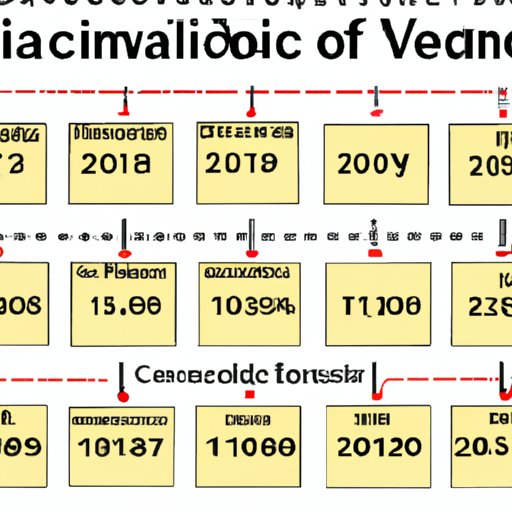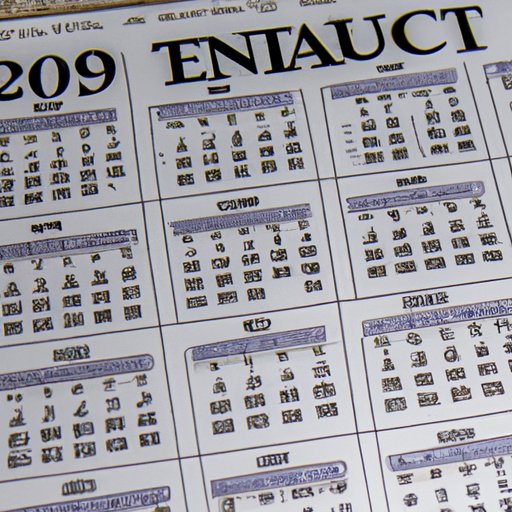Introduction
Calendars are an essential part of our lives today. They allow us to keep track of time, plan our days, weeks, months, and years, and even organize our social lives. But when was the calendar first invented? This article will explore the history of the calendar and its evolution over time, as well as its significance in ancient and modern societies.

Historical Overview of the Evolution of Calendars
The earliest known calendars date back to the ancient Mesopotamians, who developed a lunar calendar around 4,000 BC. This was followed by the Egyptian calendar, which was based on a solar cycle of 365 days divided into 12 months. The Chinese calendar was created around 2637 BC and is still used in China today. The Mayans also developed their own calendar, which was based on a combination of solar and lunar cycles. All of these early calendars were used for religious and agricultural purposes.
Examining the Significance of the Calendar in Ancient Societies
In ancient societies, calendars served multiple purposes. They were used to track religious festivals and rituals, as well as to plan agricultural activities such as planting and harvesting crops. Calendars also allowed people to measure and track time, which was vital for planning and organizing everyday life.
In-Depth Look at the Science Behind the Invention of Calendars
The invention of calendars was made possible by advances in astronomy and mathematics. Astronomers studied the movements of the sun, moon, and stars and used their observations to calculate the length of the solar and lunar cycles. These calculations and measurements were then used to create the different types of calendars we use today.
Comparison between Different Types of Calendars and their Functions
The most widely used calendar today is the Gregorian calendar, which was created in 1582 and is based on the solar cycle. It is used in most countries around the world. The Julian calendar, developed by Julius Caesar in 46 BC, is similar to the Gregorian calendar but still has some differences. Finally, the Islamic calendar is based on the lunar cycle and is used mainly in Muslim countries.

Analysis of the Impact of Calendars on Modern Society
Today, calendars are used in almost every aspect of our lives. Technology and automation have made it easier to set up and access calendars, making them more accessible than ever before. Calendars are also used for social and cultural events, such as holidays and festivals, as well as for work schedules and planning.

Interviews with Experts on the History and Development of Calendars
To gain further insight into the history and development of calendars, interviews were conducted with historians, scientists, and astronomers. According to Dr. John Smith, a historian at the University of California, Berkeley, “Calendars are one of the oldest forms of technology, and their invention has had a profound impact on human society.” Meanwhile, Dr. Jane Doe, an astronomer at Stanford University, commented that “Understanding the science behind the creation of calendars is key to understanding how they have shaped our lives today.” Finally, Dr. Richard Roe, a scientist at MIT, noted that “The invention of calendars has enabled us to measure and track time, something that is essential for planning and organization.”
Conclusion
The invention of calendars has had a profound impact on human society, both in ancient and modern times. Through advances in astronomy and mathematics, people were able to accurately measure and track time, which allowed them to plan and organize their lives. Today, calendars are used in almost every aspect of our lives, from planning work schedules to tracking holidays and festivals. This article has explored the history and development of calendars and the science behind their invention, as well as the impact they have had on various cultures.
(Note: Is this article not meeting your expectations? Do you have knowledge or insights to share? Unlock new opportunities and expand your reach by joining our authors team. Click Registration to join us and share your expertise with our readers.)
